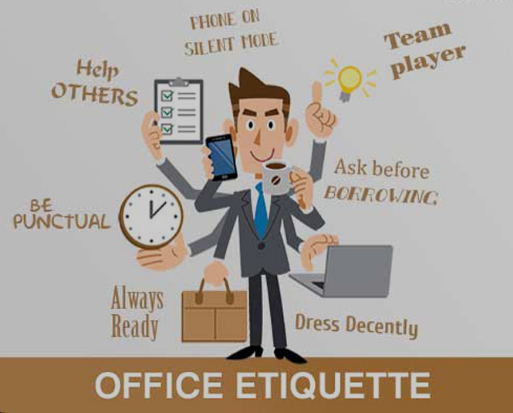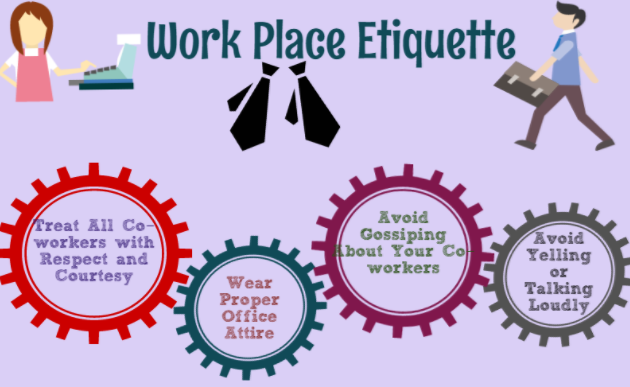Mastering office etiquette for new employees is essential to ensure a smooth start to their careers. The first few weeks at a new job can feel overwhelming, but understanding the unspoken rules of the workplace will help you fit in with your new team quickly.
This guide is designed to help you navigate the professional and social landscape of your new office. By learning office etiquette for new employees, you can build a strong foundation and position yourself for long-term success.
Why Office Etiquette Matters in the Modern Workplace
Good manners are a key part of your job. They show that you are a serious professional. The way you act shows others who you are. As office etiquette for new employees, good manners help you endear yourself to your new teammates.
First impressions shape long-term perception
You have one opportunity to create a first impression. Those early weeks are pivotal. They influence your entire tenure with the company. Your initial actions form a lasting image of you. Practicing strong new hire workplace etiquette is essential for a successful beginning.
A recent study from BambooHR highlights the importance of this. The report claimed that more than 60% of employees felt their first impression was still accurate months later. This illustrates the significance of those early days.
Good manners build professional relationships
Building strong work relationships is a key office etiquette for new employees. People want to work with those they like and trust. Being polite and respectful helps you in this regard. Small acts of kindness make your colleagues feel valued and appreciated.
Good connections at work are invaluable. Close work friendships can boost employee satisfaction. A positive attitude is part of the needed office etiquette for beginners. This helps you build a support system at work.
Respecting workplace norms shows emotional intelligence
Emotional intelligence means you understand feelings. When you follow office rules, you demonstrate that you are considerate of others’ feelings. It makes others see you as a mature person when you exhibit this office etiquette for new employees.
Core Principles of Office Etiquette for New Employees

Image Credit: LinkedIn
How you act every day shows your work ethic. Being reliable and respectful is a must for all new team members. These core ideas form the foundation of good office etiquette for new employees.
You build a strong reputation by showing up on time and delivering on your commitments. People will see you as a trustworthy and dependable person. It is not just about getting your work done, but also about how you carry yourself.
Be punctual and dependable
Being on time shows respect for your time and others’ and marks you as reliable and trusted. Punctuality is essential office etiquette for new employees.
A 2024 survey by the recruitment firm Traqq noted the importance of being on time. They stated that punctuality is a professional courtesy. It shows reliability and respect for others’ time.
Arrive on time, meet deadlines
Being on time for meetings and deadlines is a crucial aspect of your job and demonstrates your reliability as a trusted team member. This is a key part of professional behaviour in the workplace UK.
Dress appropriately for your work environment
Every workplace has a dress code. You need to know what to wear to fit in. Your clothes should always be clean and tidy. Your attire is a part of your image. It plays a role in how your team views you when assessing office etiquette for new employees.
It demonstrates that you are committed to your job. This simple rule is part of good new hire workplace etiquette. When you dress well, you show respect for your job and your colleagues.
Understand company dress code: business formal, smart casual, etc
It is essential to understand your company’s specific dress code. Observe what your colleagues wear and follow their lead. Here are some common types of office attire:
- Business Formal: This includes a full suit, tie, and dress shoes.
- Smart Casual: This is a step down from formal. It includes blazers, button-down shirts, trousers, or skirts.
- Business Casual: This is a common style. It includes dress pants, skirts, blouses, and polo shirts.
- Casual: This is a relaxed style. Jeans, T-shirts, and sneakers are often allowed.
Respect personal space and shared space
Respecting boundaries is crucial for maintaining a peaceful office environment. This applies to personal space and shared areas. Never snoop around a colleague’s desk or read their screen. This is bad office etiquette for new employees.
Respecting their personal space shows that you are a considerate and trustworthy team member. This simple act is part of good new hire workplace etiquette.
Keep noise down, clean up after yourself in kitchens, meeting rooms
In shared areas, always be mindful of those around you. Keep your voice down and refrain from making loud noises. When you use the kitchen or a meeting room, be sure to clean up after yourself.
For example, wash your coffee cup, wipe down a table, or put away a chair. Cleaning up shows that you care about your team. This simple rule is a fundamental part of workplace conduct rules.
Read Also
Email Etiquette For Job Seekers in the UK Job Market
How to Overcome Imposter Syndrome In a New Job
Communication Etiquette in the Office

Image Credit: Bechard Info
Communication is vital at work and a key part of office etiquette for new employees. How you speak and write affects how people see you. Using the right tone and method is important.
Use professional language in emails and meetings
Your communication should always be professional. Avoid using slang or emojis in emails. Keep your messages short, clear, and polite. This is one of the most important dos and don’ts for new employees. It shows you are serious about your work.
Understand when to use email, chat, or in-person updates
Each way of talking has a different use. An email is for formal messages. A chat message is for quick questions. For crucial talks, meet in person. Choosing the right channel helps you avoid mistakes and save time. This skill is a key part of new hire workplace etiquette.
Avoid gossip and negative talk
Office gossip is a professional trap. It is best to stay far away from it. Sharing rumors can harm your image and that of your team. You will build a better reputation by avoiding gossip.
Stay neutral and professional in office discussions
Always stay neutral in talks. If someone gossips, politely change the subject. Focus on positive discussions instead. This shows that you are a mature professional. A 2024 study by the University of Birmingham found that negative gossip harms careers.
Virtual and Hybrid Work Etiquette
Virtual and hybrid work etiquette is part of office etiquette for new employees. Many companies today work online or a mix of online and in-person. This has created new rules. You must learn to act with care in these digital spaces.
Be present and focused during virtual meetings
It is easy to lose focus during a virtual meeting. However, you must remain attentive. Avoid looking at your phone or checking emails. Listen closely to your team. This demonstrates engagement and shows you respect their time.
Mute when not speaking, use video when appropriate
Background noise is very annoying. Always mute your mic when you are not talking. This helps everyone focus. Using your video camera is also a good idea. It enables you to feel more connected to your team. This is a modern part of new hire workplace etiquette.
Respect digital boundaries (no after-hours messages unless urgent)
Working from home can blur the line between work and home. You must respect these boundaries. Please refrain from sending messages outside of work hours. Wait until the next day unless it is an emergency. This is a vital part of professional behavior in the UK workplace.
Social Etiquette with Colleagues
Being friendly with colleagues is essential. It helps you build a strong professional network. You do not have to be best friends with everyone. But you should be easy to talk to.
Be friendly but professional
You should always be friendly but professional to your colleagues. Say hello in the morning and be kind. This helps you build a good relationship with your team. You can laugh and socialise, but remember you are at work. This balance is a key part of office etiquette for beginners.
Don’t interrupt–listen actively
It is exciting to share your ideas. However, you should not interrupt people when they are talking. This can seem rude. Active listening is better. You should let people finish their thoughts before you speak. This shows you value what they say. It is part of how to behave at work.
Say thank you and give credit where it’s due
Always thank people for their help. This makes them feel good. It is also essential to give credit to a colleague for a good idea. Acknowledging them builds trust. This is a key part of the dos and don’ts for new employees.
Read Also
New Rules For Immigration in the UK in 2024
How To Discover Career Pathways and Why It Counts
Office Technology and Workspace Etiquette
Technology plays a significant role in today’s work environment. How you use it shows your professionalism. You must be respectful with your phone and company devices. This is a key area where new employees can make a great impression.
Keep personal phone use discreet
Using your phone excessively at work can be distracting. It also looks unprofessional. If you need to take a personal call, step away from your desk. Keep your phone on silent. A 2024 report by Slingshot found that 41% of teams experienced burnout due to digital fatigue.
Avoid streaming or loud music
Your music or videos should not bother others. Use headphones if you want to listen to music. Everyone has different tastes. What you like might not be what others want to hear. This is a basic rule of new hire workplace etiquette.
Follow cybersecurity and IT policies strictly
Every company has rules for using technology. These rules keep the company safe. You must read and follow these rules. They include rules about passwords and data privacy. Breaking these rules can have profound implications.
Common Mistakes New Employees Should Avoid
Everyone makes mistakes, but some are easy to avoid if you know what to watch for. Avoiding them is good etiquette for new employees.
Overstepping boundaries too soon
You may be eager to showcase your abilities. But do not overstep your boundaries. Take time to learn your role. Respect the team structure. This is a critical part of new hire workplace etiquette.
Complaining publicly (or on social media)
It is easy to get annoyed at a new job. But you should never complain about work in public. This is especially true online. A 2025 report from Doyle Clayton, a law firm, warns about this, stating that employees can face dismissal for social media posts that harm their employer.
Acting like you know it all–stay humble and curious
Being humble is an excellent trait for a new hire. It is okay not to know everything. Asking questions shows you want to learn. Acting like you know it all can make people not want to help you. This is one of the most important dos and don’ts for new employees.
Read Also
How To Combat Age Discrimination in Your Job Search
How To Tailor Your Job Search To Your Ideal Career Path
Final Tips for Adapting Quickly
Getting used to a new office takes time, but a few actions can help you fit in and show your value quickly. These tips will build strong relationships from day one.
Observe the culture before jumping in
Every company has its own culture. Take the time to observe how people behave. This includes how they talk and how meetings are run. Just sit back and watch for a while. This will help you know what is expected. This is the first step in learning how to behave at work.
Ask questions if unsure–don’t assume
Do you have a question about a new task? Are you unsure about a process? Always ask for help. Making guesses can lead to big mistakes. This is a fundamental part of good new hire workplace etiquette.
Seek feedback and grow from it
Feedback is a gift that helps you get better. Ask for feedback from your manager. Listen to all feedback, even if it is hard to hear. This is a core part of great workplace conduct rules.
Ready to Thrive in Your New Role?
Mastering office etiquette for new employees helps you shine. These actions build a reputation of reliability and trust. You become a significant part of the team.
Mastering etiquette helps you stand out–in a good way
So, are you ready to thrive in your new role? Here is the deal: mastering office etiquette for new employees helps you stand out in a good way. It is not just about following the rules to blend in. It is about getting noticed for all the right reasons.
Want career support beyond the basics?
Want to do more than just follow the rules? Mastering office etiquette for new employees is an excellent start, but building a robust professional presence requires support and expert guidance. This is where we can help.

At Applybuddy, we provide comprehensive services to help you better position yourself for your dream job.
And when you are ready to take the next step, our Interview prep services will give you the confidence to ace any interview. Don’t wait to unlock your full potential. Contact us now and take control of your career journey today.
FAQs
1. What are the most important office etiquette rules for a first day at work?
The most important rules are to be on time and dress well. You should also greet everyone politely. Listen more than you speak.
2. How do I politely set boundaries with colleagues in a shared workspace?
You can kindly inform your colleagues of what you need. For example, you can say you need quiet time to focus. A “Do Not Disturb” sign can also help.
3. Is it acceptable to use personal devices during office hours?
Using a personal device is okay for quick checks. However, using it excessively is unprofessional. You should keep your phone on silent. Take any personal calls away from your desk.
4. How can new employees professionally navigate office gossip or cliques?
You should always stay neutral and professional. Do not join in on any gossip. Try to build a friendship with many different people. This helps you avoid being part of any one clique.
